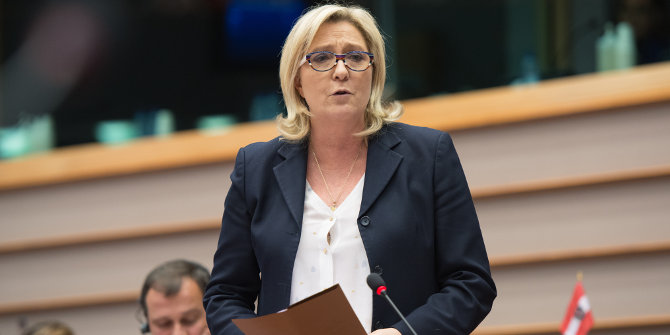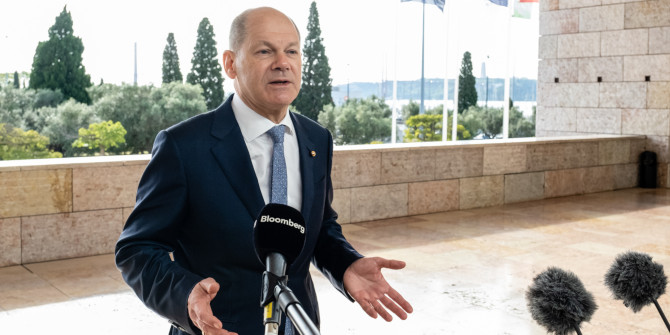 UKIP has watched as its competitors on the mainstream and radical right have exited the electoral field. Robert Ford writes that previously Conservative-voting ‘strategic Eurosceptics’ along with the BNP’s ‘polite xenophobes’ have joined UKIP’s ranks giving Nigel Farage and his party an unprecedented political opportunity.
UKIP has watched as its competitors on the mainstream and radical right have exited the electoral field. Robert Ford writes that previously Conservative-voting ‘strategic Eurosceptics’ along with the BNP’s ‘polite xenophobes’ have joined UKIP’s ranks giving Nigel Farage and his party an unprecedented political opportunity.
Radical right parties mobilise a complex mix of resentments, against immigration and multiculturalism, corrupt and self-serving elites, a liberal popular culture and the lax morals it tolerates, and the decline of national culture and national sovereignty. A growing number of parties across Europe have mobilised this heady, emotive mix of identity, anxiety and intolerance to break through into national political representation, and even into government.
Over the past decade, Europe has become more closely entwined with four of the central concerns of the radical right. Nationalist concerns about the loss of sovereignty to Europe have grown as evidence of the power of EU institutions, and popular rejection of that power, have accumulated. Authoritarian voters, concerned about maintaining law and order and protecting society from threats have seen British governments losing battles with European institutions, particularly the European Court of Human Rights, over issues such as votes for prisoners and deportation of criminals.
Voters anxious about immigration see Europe looming larger too. Since the accession of the poorer post-Communist “A8” countries in 2004, and the decision by the Blair government to accept unrestricted migration from these countries, central and Eastern Europe have become the principle source of unskilled labour migration to Britain. Populists mobilising hostility to immigration can say, with justification, that such migration can only be controlled by changing our relationship to Europe.
Europe has also emerged as a stronger theme in populist narratives railing against out of touch self-serving political elites. Populists can point to the frustration of public opinion in the repeated refusal of both Labour and the Conservatives to offer the public a referendum on Europe, or to seriously consider proposals for any fundamental reform of relationships with the European Union. They can also point to the prominence in EU politics of senior political figures from both governing parties as evidence of an elite clique maintaining self-serving links with the lucrative and powerful Brussels gravy train.
In short, over the past decade it has become much easier for radical right politicians to argue that Europe is “the problem”; the source of immigration threatening British jobs and cultural identity, the source of judicial rulings protecting terrorists and criminals who threaten British safety, the source of a corrupt and self-serving elite political culture, and the source of endless rules and legislation limiting British sovereignty and threatening British identity.
Europe also plays a second, subtler role for populist right wing politicians – it helps to legitimate them. Research suggests that many voters are internally conflicted about sensitive political issues, such as Islam, immigration and identity – they may have strong concerns about these issues, but reject organisations like the BNP and EDL due to their association with violence, racism or fascism. Voters such as this will reject parties, such as the British National Party, which are perceived purely as vehicles for mobilising intolerance. The most successful radical right politicians are often, paradoxically, those who start by talking about something else.
The contrasting treatment of BNP leader Nick Griffin and UKIP leader Nigel Farage over the past decade provides an example of this effect in action. Griffin’s efforts to appeal to a more mainstream audience were hamstrung by his party’s legacy of fascism and violence, which lead the media, other politicians, and the electorate to treat him as a pariah. Nigel Farage, by contrast, has been able to raise similar contentious questions about immigration, Islam and identity in mainstream political forums such as Question Time without being attacked as a racist or a fascist thanks to his roots in a more legitimate tradition of Eurosceptic politics.
My research with Matthew Goodwin and David Cutts suggests that UKIP have already been successful at mobilising beyond its core issue of Euroscepticism, developing an “uneasy coalition” of two distinct electorates. “Strategic Eurosceptics” are older alienated Conservatives supporting UKIP as a means to express dissatisfaction with the mainstream status quo over Europe. “Polite xenophobes” are more economically insecure, working class voters who hold strongly populist views on a range of issues – including hostility to immigrants, anxiety about Islam and disaffection with mainstream politics – and who regard UKIP as an outlet for these views.
As the chart below shows, the attitudes of UKIP voters in the 2009 European Parliament elections fell squarely between the Conservatives and the BNP on core radical right issues: xenophobic hostility to immigrants, populist hostility to elites and racial prejudice against minorities. UKIP’s “core” voters (UKIPc) – who expressed an intent to support the party in Westminster elections as well as Strasbourg elections – expressed populist views even more strongly that “strategic” voters (UKIPs) who said they would support the party in European elections.
Figure 1: Attitudes of Conservative, UKIP and BNP voters in the 2009 European Parliament elections on four scales.

Source: YouGov European Parliament poll, 2009
Recent political events have reduced the competition UKIP faces in building a “populist Eurosceptic” support base. The collapse of the BNP means UKIP now faces no competitor on the extreme right, leaving it free to recruit heavily from the 20 per cent of the electorate who hold radical right views on a broad range of issues. In recent local elections some of UKIP’s strongest performances have come in areas where the BNP has recently collapsed, suggesting it is already reaping these benefits. The constraints the Conservatives face in coalition also leaves UKIP with more freedom to recruit from the centre-right on Europe but also on radical right issues such as law and order or immigration, and populist resentment of an out of touch governing class of “posh boys”.
UKIP still faces formidable obstacles – such as balancing the demands of EU focussed activists and domestically focussed voters, and finding a way to break through the barriers presented by the first past the post electoral system used in local and Westminster elections. Despite this, Nigel Farage’s party has an unprecedented opportunity, for at the very moment when its core issue of Europe has become intertwined with broader radical right domestic concerns over identity, security, and immigration, UKIP’s main competitors on the mainstream and radical right have vacated the field.
Please read our comments policy before commenting.
Note: This article gives the views of the author, and not the position of EUROPP – European Politics and Policy, nor of the London School of Economics.
Shortened URL for this post: http://bit.ly/KDblAx
This article first appeared on the British Politics and Policy at LSE blog.
_________________________________________
About the author
 Robert Ford – University of Manchester
Robert Ford – University of Manchester
Robert Ford is Hallsworth Research Fellow at the University of Manchester. He researches immigration, prejudice and the radical right, and is currently working with Matthew Goodwin (Nottingham) on a book about UKIP and the BNP. Much of his research can be found here and he tweets under the handle @robfordmancs






Whatever the opinions and prejudices of people who choose to vote UKIP, UKIP is most certainly not a xenophobic or racist party.
It believes in the United Kingdom’s right to govern itself. How is that extreme? However, it is, most certainly, right (as in ‘correct’)
Often, Labour and Conservative voters are neither socialist nor conservative, mainly voting in a tribal manner: “my family have always voted…”. Others believe what they see and hear on TV and vote as if under mass hypnosis.
Are we ever going to get an adequate response from Matthew Goodwin about why he disregards the possibility that many Conservative supporters are tactical Tory voters who’d prefer to vote UKIP? Why is Tories switching to UKIP “strategic” but not vice-versa?
Anyone who believes that the views of the members of their political party doesnot relate to the views and policies of that party is wearing rose tinted spectacles. If you arent anti-imiigration, anti-europe, etc then these people wouldnot choose to support you. OK so UKIP believes in Britain’s right to rule itself – -what about the rights of all of the countries that Britain over the centuries has invaded, ruled, destroyed? And it continues to do so now. Europe (included Britain) has to be held accountable for the issues in a lot of third world countries where we have stuck our oar in – -India, Africa, South America to name a few. It isnt Xenophobia – it is verging on the old days of Imperialism. Now Europe (UK included) is bankrupting itself and is turning in on itself when it only has itself to blame. Give Greece the Olympics permanently and particpating countries can help fund and support it. No more ridiculously expensive competitions to host them, or gold coloured brand new bmws chugging around the countryside keeping up with the torchbearers through areas of deprivation and joblessness. Like it or not, the world is intertwined and every country in the world relies on each other for survival.We have to put aside the greed and help each other.